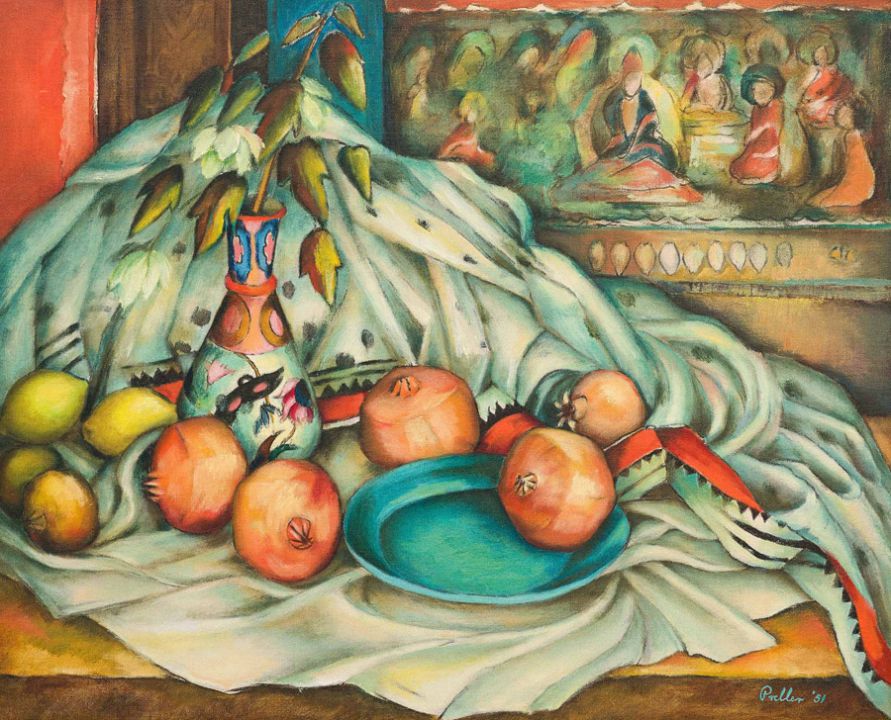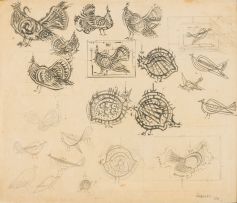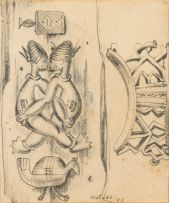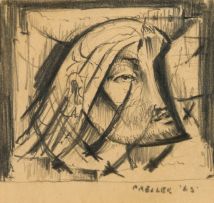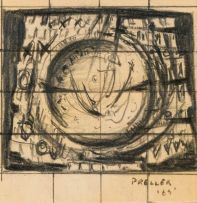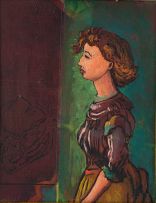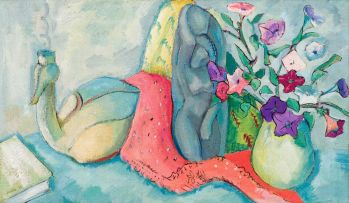Important South African and International Art
Live Auction, 5 June 2017
Evening Sale
Incl. Buyer's Premium & VAT
About this Item
signed and dated '51
Notes
After Alexis Preller's return in 1949 from his painting sojourn along the east coast of Africa in the remote island group of the Seychelles, he painted the 1951 Still life with Thangka and Pomegranates and was to undertake a number of similarly sized still lives over the next three years that evoked a sumptuous exoticism in their use of rich colour and evocative ambience. Preller's compositions capture the still life from a slightly elevated view, revealing the objects perfectly arrayed across a shallow shelf. In another work such as Seychellois Still Live, 1949, the pomegranates, lemons, flowers and the flamboyantly coloured leaves are painted in typically Prelleresque dark mauves, pinks, oranges, yellows, lime greens and viridian. The works are also punctuated with strident lapis blue accents which further enliven their visual syntax.
These works all share a shallow composition, the space articulated by draped cloth that cascades over the edge in the foreground, a definitive device quoted from the great European tradition of carefully constructed still life paintings to be seen from Chardin and Cezanne to Gauguin. Preller embraces this tradition to his own ends and transforms the everyday talismans of his life into a more symbolic visual tableau, something more akin to the works of Gauguin, the abiding influence on his work.
Preller drapes his still lives luxuriantly with plain coloured or distinctively decorated cloths. These geometrically decorated Swahili cloths, collected from the east African coast, form a dramatic backdrop to the objects, their strident graphic detail used by Preller to activate, animate or structure the composition. In the 1951 Still life with Thangka and Pomegranates, the brilliant red patterned edge of the cloth snakes its way through the objects in the mid-ground, the black serrations on it like the teeth of a crocodile creating an unnerving leitmotif. The backdrop of cloth puckers into a mountain-like form which then cascades downwards across the surface spilling over the front edge of the shelf.
In the Tatham Art Gallery's version, Still Life with Pomegranates of 1951, and in the work on auction, the Persian vase, so often seen in Preller's work, becomes a central object, its elegant tapered form and lyrically decorated surface with its arabesque of flowers, leaves and patterned roundels is a significant recurring object in Preller's work. This vase, given to him as a boy by his mother, was cherished and was often referred to by Preller as one of his 'household gods', a collection of modest but important objects that were to inspire works throughout his lifetime.
Finally, the mythological tableau in the background evokes a radiant sage surrounded by an aura, a mandorla of light. A gathering of seated figures with halos surround him and seem to pay obeisance to him. The fascinating fact is that this central holy figure seems a direct reference to a fine Tibetan thangka which Preller owned and hung in pride of place above his fireplace on the back wall of his beloved small thatched home, Ygdrasil, on the outskirts of Pretoria. An historic photograph by Constant Stuart shows Preller standing next to this ornately gilt-framed thangka in the large living space of his studio, surrounded by a number of significant Preller still lives of the time, including The Feast of 1946 and the mysterious Strange Altar of 1945.
Karel Nel
Illustrations to include in catalogue:
Page 122 Africa the Sun and Shadows: Preller standing below his Tibetan Thangka above his fireplace at his home Ygdrasil circa 1948 - 1950
Page 52 Collected Images: Still Life with Pomegranates 1951 oil on canvas Tatham Art Gallery Pietermaritzburg
Alexis Preller Seychellois Stil Life '49 (see Strauss website)
Page 37 Collectected Images - photo of the vase
Cezanne Table Napkin with Fruit - Barnes Foundation
Provenance
Purchased directly from the artist.
